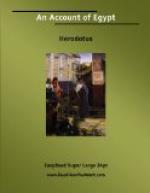Thus do these defend that which they do, which by me is disallowed: but the Egyptians are excessively careful in their observances, both in other matters which concern the sacred rites and also in those which follow:—Egypt, though it borders upon Libya, does not very much abound in wild animals, but such as they have are one and all accounted by them sacred, some of them living with men and others not. But if I should say for what reasons the sacred animals have been thus dedicated, I should fall into discourse of matters pertaining to the gods, of which I most desire not to speak; and what I have actually said touching slightly upon them, I said because I was constrained by necessity. About these animals there is a custom of this kind:—persons have been appointed of the Egyptians, both men and women, to provide the food for each kind of beast separately, and their office goes down from father to son; and those who dwell in the various cities perform vows to them thus, that is, when they make a vow to the god to whom the animal belongs, they shave the head of their children either the whole or the half or the third part of it, and then set the hair in the balance against silver, and whatever it weighs, this the man gives to the person who provides for the animals, and she cuts up fish of equal value and gives it for food to the animals. Thus food for their support has been appointed and if any one kill any of these animals, the penalty, if he do it with his own will, is death, and if against his will, such penalty as the priests may appoint: but whosoever shall kill an ibis or a hawk, whether it be with his will or against his will, must die. Of the animals that live with men there are great numbers, and would be many more but for the accidents which befall the cats. For when the females have produced young they are no longer in the habit of going to the males, and these seeking to be united with them are not able. To this end then they contrive as follows,—they either take away by force or remove secretly the young from the females and kill them (but after killing they do not eat them), and the females being deprived of their young and desiring more, therefore come to the males, for it is a creature that is fond of its young. Moreover when a fire occurs, the cats seem to be divinely possessed; for while the Egyptians stand at intervals and look after the cats, not taking any care to extinguish the fire, the cats slipping through or leaping over the men, jump into the fire; and when this happens, great mourning comes upon the Egyptians. And in whatever houses a cat has died by a natural death, all those who dwell in this house shave their eyebrows only, but those in which a dog has died shave their whole body and also their head. The cats when they are dead are carried away to sacred buildings in the city of Bubastis, where after being embalmed they are buried; but the dogs they bury each people in their own city in sacred tombs; and the ichneumons are buried just in the same way as the dogs. The shrewmice however and the hawks they carry away to the city of Buto, and the ibises to Hermopolis; the bears (which are not commonly seen) and the wolves, not much larger in size than foxes, they bury on the spot where they are found lying.




